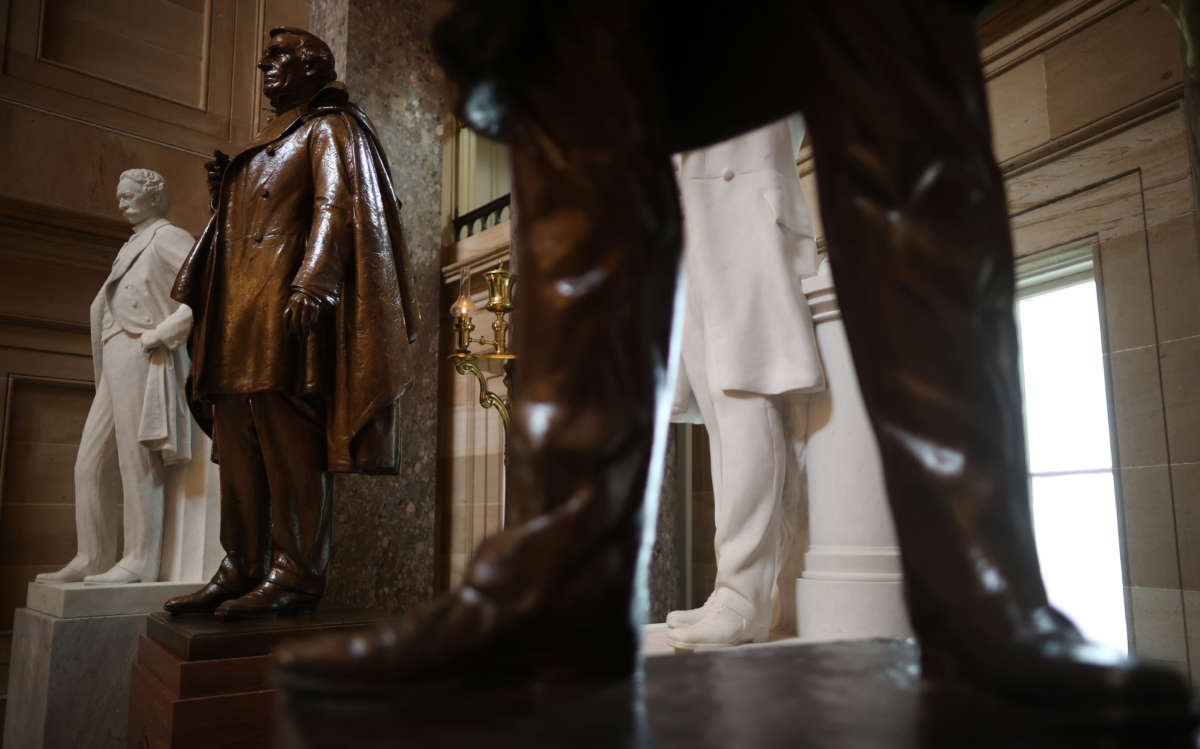Did you know that Truthout is a nonprofit and independently funded by readers like you? If you value what we do, please support our work with a donation.
Lawmakers in the U.S. House of Representatives are set to vote Tuesday on a bill that, if enacted, would remove statues of Confederate figures as well as replace the bust of a Supreme Court jurist who authored what is considered one of the worst decisions in the country’s history.
The bill promoted by Democrats calls for the removal of likenesses of Confederate President Jefferson Davis, his vice president John C. Calhoun, and other individuals linked to the Confederacy in Congress’s Statuary Hall.
The bust of Chief Justice Roger B. Taney, who penned the antebellum Dred Scott decision in 1857 declaring that Black individuals in the U.S. could not be conferred full citizenship rights, would also be removed and replaced by a bust of Thurgood Marshall, the first Black person to serve on the Supreme Court.
The bill is a repeat of a similar measure pushed by Democrats during the last congressional sessions and which received the additional support of 72 Republicans in the final vote. The bill was defeated, however, by Republican lawmakers with a voice vote in the GOP-controlled Senate at the time.
It is highly likely that the current bill will face similar opposition, as it will require attaining a filibuster-breaking threshold of 60 votes in the evenly divided Senate in order to get passed.
House Majority Whip Rep. James Clyburn (D-South Carolina) said the measure was important, especially following the attack on the Capitol building this year by a mob of loyalists to former President Donald Trump, many of whom carried Confederate insignia and battle flags during the rampage.
“On January 6th, we experienced the divisiveness of Confederate battle flags being flown inside the U.S. Capitol. Yet there are still vestiges that remain in this sacred building that glorify people and a movement that embraced that flag and sought to divide and destroy our great country,” Clyburn noted. “This legislation will remove these commemorations from places of honor and demonstrate that as Americans we do not celebrate those who seek to divide us.”
Most Americans, by a slim margin, support removing Confederate statues and monuments that are littered around the United States. An NBC News/Wall Street Journal poll last summer found that 51 percent of voters supported doing so, while 47 percent were opposed.
Though the poll highlighted how closely divided Americans were on the issue, there was an overwhelming consensus that something had to be done, as only 16 percent said such monuments should be left alone with no changes to them whatsoever. Thirty-one percent, meanwhile, said that monuments should have a plaque added to them to give them more historical context, while a plurality, 41 percent, said statues should be removed from public spaces and perhaps placed in museums instead.
Defenders of Confederate monuments have made dubious arguments that removing statues or monuments associated with Confederate figures would somehow be akin to erasing history. But as social commentator s.e. smith, writing for Truthout in 2019, has noted, such arguments are deeply flawed.
“Removing statues from display doesn’t silence history — but it does allow them to be presented in better context, allowing people to understand the history of Confederate monuments and the role they played in communities,” smith wrote. “Leaving them installed on public land lends them, and the things they symbolize, an official air — one that lends weight to white supremacists across the country.”
Taking those displays down “won’t magically fix racism or end an intergenerational system of oppression,” smith pointed out, “but it’s a step in the right direction for cities willing to back that decision with a genuine conversation about how to address racial equity.”
Trump is silencing political dissent. We appeal for your support.
Progressive nonprofits are the latest target caught in Trump’s crosshairs. With the aim of eliminating political opposition, Trump and his sycophants are working to curb government funding, constrain private foundations, and even cut tax-exempt status from organizations he dislikes.
We’re concerned, because Truthout is not immune to such bad-faith attacks.
We can only resist Trump’s attacks by cultivating a strong base of support. The right-wing mediasphere is funded comfortably by billionaire owners and venture capitalist philanthropists. At Truthout, we have you.
Truthout has launched a fundraiser, and we have only 72 hours left to raise $24,000. Please take a meaningful action in the fight against authoritarianism: make a one-time or monthly donation to Truthout. If you have the means, please dig deep.
